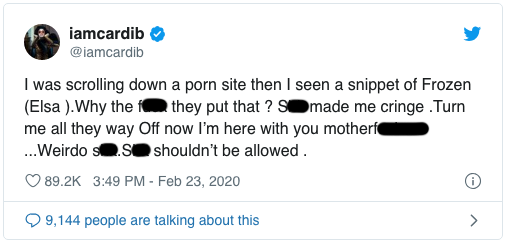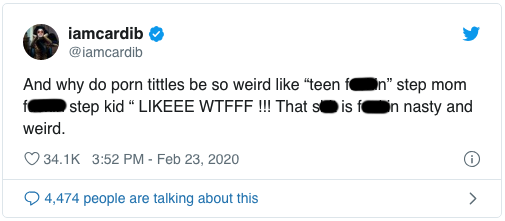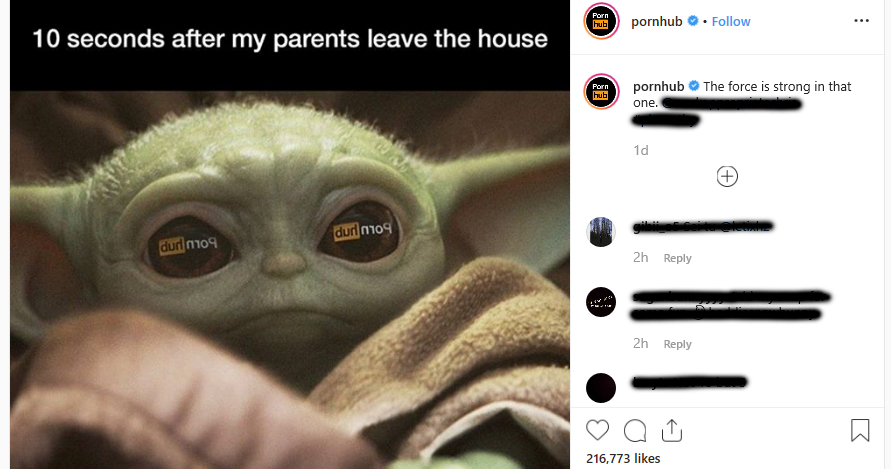Many pornography users try to avoid the disquieting and exploitative realities of the pornography industry, but the truth is impossible to avoid forever. In late February 2020, popular music artist and self-described pornography consumer Cardi B publicly opened up about being confronted by the exploitative nature of pornography in a way she could not shake.
Although she stopped short of condemning pornography as a whole, the experience Cardi B described on Twitter points directly toward a massive problem with pornography that many try to ignore or dismiss.


This is important commentary in regard to the state of the cultural dialogue surrounding pornography. For too long, pornography has been deemed by many to be an acceptable part of modern society. Most who disagreed with that perspective were often dismissed as “moralists.”
However, scientific and anecdotal evidence loudly disagrees with pornography apologists who try to blame “moralism” for any bad press. The data has made it clear that the harms of pornography are factual and evidence-based.
The Inherent Harms and Exploitation of Pornography
Far from being “acceptable,” the production and consumption of pornography is inherently exploitative and the harms it causes have far-reaching negative impacts on participants, consumers, and society at large.
Lest anyone attempt to write off Cardi B’s experience with finding child sexual abuse-themed pornography as an anomaly, it’s important to recognize that the types of pornographic material she encountered are increasingly prevalent and popular on mainstream pornographic websites such as Pornhub. Laila Mickelwait, Director of Abolition at Exodus Cry, has been working hard to shed light on the troubling fact that one of the most-searched terms on Pornhub is “teen” pornography. Those searches are so prevalent that, as of early 2020, “teen” pornography has been a top ten search term on Pornhub for six years running. The following excerpt from Mickelwait’s Change.org petition includes real “content” examples from Pornhub that corroborate Cardi B’s experience.
Many [videos] feature girls who look 13 years old at best — girls with braces, pigtails, flat chests, no makeup, extremely young faces, holding teddy bears and licking lollipops, all while being aggressively penetrated. A quick search for the word “teen” turns up titles such as “Young Girl Tricked,” “Innocent Brace Faced Tiny Teen F—ed,” “Tiny Petite Thai Teen,” “Teen Little Girl First Time,” on and on ad infinitum. [Source: Laila Mickelwait]
The presence and impact of child sexual abuse-themed pornographic content is not just anecdotal.
A recent study found that not only is exposure to pornography associated with attitudes supporting violence against women, sexual harassment, and sexual coercion, but that the disturbing trend of aggression found in the study had a strong link to pornographic content featuring teenagers. Related and equally troubling, mainstream websites like Amazon currently sell thousands of incest-themed pornographic books that attempt to portray child sexual abuse by a parent, stepparent, or a parent’s live-in romantic partner as an acceptable “fetish.”
More troubling still, the modern online pornography industry is built to cash in on the ever-escalating “tastes” of pornography consumers. As a result, algorithm-driven scale-free networks built by the likes of online pornography’s industry-leader Mindgeek are resulting in many young children being exposed to hardcore pornography almost immediately upon their first encounter with online pornography and society has yet to acknowledge, let alone fully understand, the scope of those implications.

As if all of the above weren’t enough to convince someone of pornography’s inherent harms, it’s crucial to also note the links between pornography and sex trafficking as they are interconnected through the global supply chain of sexual exploitation.
As you can see, the above-mentioned tweets Cardi B published about pornography speak to a far-from-inconsequential reality. Science and human experience are continually converging on the consensus that a) pornography is inherently harmful and b) the modern online pornography industry is increasing both the scope and depth of those harms.
Accordingly, we are calling on corporations like Visa, a member of our 2020 Dirty Dozen List, to stop partnering with the pornography industry by discontinuing its business of processing payments for pornography websites like Pornhub. You can help the cause by taking action via the easy-to-use form below.


